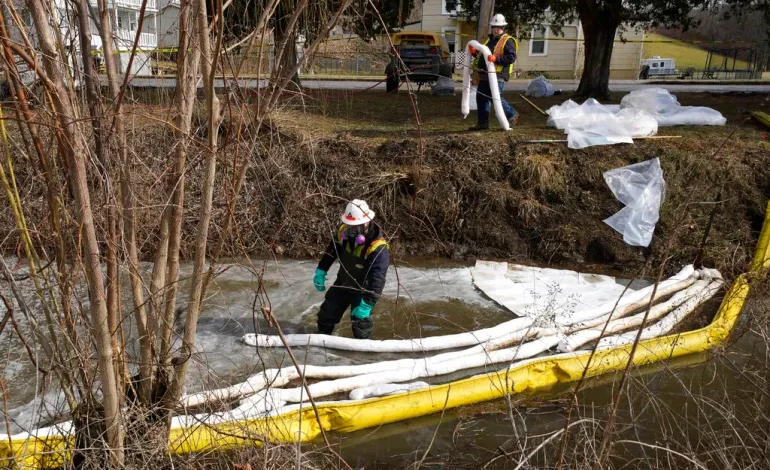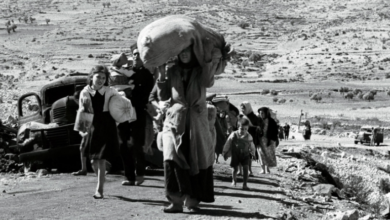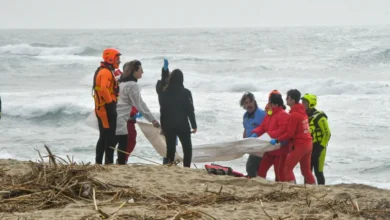Preliminary report offers new details about US train derailment

The crew operating a freight train that derailed in East Palestine, Ohio did not receive a critical warning about an overheated axle until just before dozens of cars went off the tracks, according to United States federal safety investigators.
An engineer slowed and stopped the train after getting a “critical audible alarm message,” according to a preliminary report published Thursday by the National Transportation Safety Board (NTSB). The crew then saw fire and smoke and alerted dispatch of a possible derailment, the report said.
The axle investigators are focused on had been heating up as the train went down the tracks, but did not reach the threshold for stopping the train and inspecting it until just before the derailment, the report said. The train was going about 75 km/h (47 mph) at the time, just under the speed limit of 80 km/h (50 mph), according to safety investigators.
The NTSB released its preliminary findings as Transportation Secretary Pete Buttigieg visited East Palestine for the first time to tour the site.
The February 3 derailment led to evacuations and fears of air and water contamination after a controlled burn of toxic chemicals aimed at preventing an explosion.
The government is facing growing criticism over the federal response to the derailment. The White House has defended its response, saying officials from the Environmental Protection Agency, NTSB and other agencies were at the rural site within hours of the derailment. The White House says it has also offered federal assistance, and the Federal Emergency Management Agency (FEMA) has been coordinating with the state emergency operations centre and other partners.
Buttigieg has faced criticism for not visiting the site earlier, including from former President Donald Trump, who travelled to Ohio on Wednesday. The Department of Transportation said Buttigieg is visiting now that the US Environmental Protection Agency (EPA) declared the emergency phase of the crash to be over and the start of long-term cleanup efforts is under way.
Heather Bable, who lives two blocks from the derailment site, said she is relieved the government’s top brass is finally showing up.
“We need that attention because we weren’t getting it. They should have been here all along,” said Bable, who was among the throngs of residents lining the streets in pouring rain to welcome Trump on Wednesday.
The reception for Buttigieg was decidedly more muted, with little fanfare around the town of just under 5,000 residents. Trump won nearly 72 percent of the vote in this heavily Republican region in the 2020 election.
Buttigieg’s visit came nearly three weeks after more than three dozen freight cars — including 11 carrying hazardous materials — derailed on the East Palestine outskirts, near the Pennsylvania state line, prompting an evacuation as fears grew about a potential explosion of smouldering wreckage.
Officials seeking to avoid an uncontrolled blast intentionally released and burned toxic vinyl chloride from five rail cars, sending flames and black smoke high into the sky. That left people questioning the potential health effects even as authorities maintained they were doing their best to protect people.
As remediation of the site continued, railway company Norfolk Southern announced late Wednesday that it had agreed to excavate the soil under two tracks. Ohio Governor Mike DeWine had called out the railroad company’s failure to address the contaminated soil underneath its tracks before repairing them and running freight again.
“Our original plan would have effectively and safely remediated the soil under our tracks. As I listened to community members over the past two weeks, they shared with me their concerns about that approach. I appreciate the direct feedback, and I am addressing it,” Norfolk Southern President and CEO Alan H Shaw said in a written statement.Democratic US Representative Chris Deluzio, whose Pennsylvania district borders the East Palestine disaster site, asked Norfolk Southern to expand the boundaries of the geographic zone in which it is providing financial assistance and testing. He asserted the current zone excludes many affected Pennsylvania residents and businesses, and said the company should commit to cleaning up soil and water up to 48km (30 miles) beyond it.










